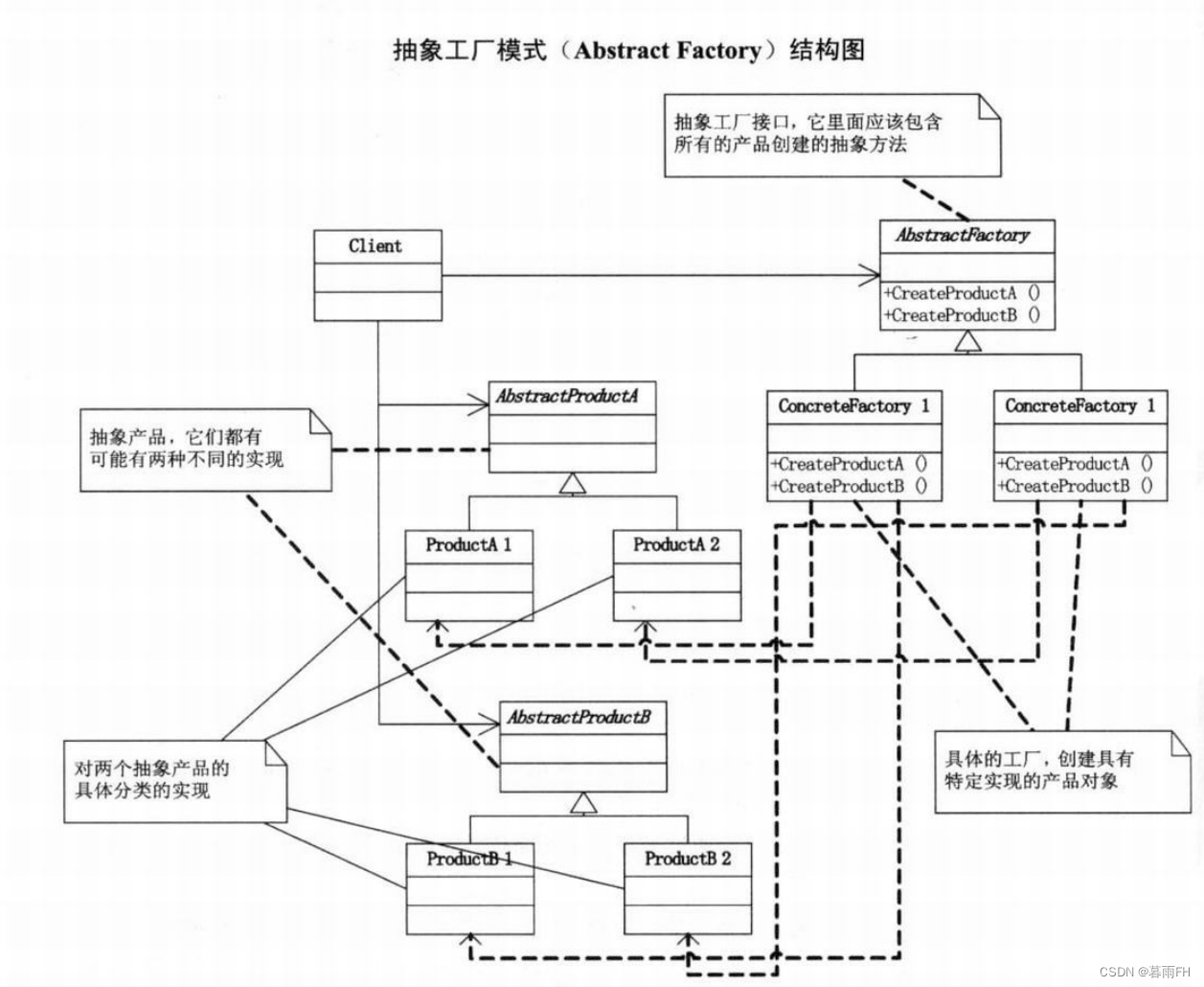抽象工厂模式(Abstract Factory)
抽象工厂模式是一种创建型设计模式 ,提供一个创建一系列相关或相互依赖对象的接口,而无需指定它们具体的类。

c++
#include <iostream>
#include <string>
using namespace std;
// 产品系列中的每个不同产品都应有一个基本接口。产品的所有变体都必须实现此接口。
class AbstractProductA
{
public:
virtual ~AbstractProductA(){};
virtual string UsefulFunctionA() const = 0;
};
// 具体产品是由相应的具体工厂创建的
class ConcreteProductA1 : public AbstractProductA
{
public:
string UsefulFunctionA() const override
{
return "The result of the product A1";
}
};
class ConcreteProductA2 : public AbstractProductA
{
public:
string UsefulFunctionA() const override
{
return "The result of the product A2";
}
};
// 另一个产品的基本接口
// 只有同一类的产品之间才可以有适当的交互
class AbstractProductB
{
public:
virtual ~AbstractProductB() {}
virtual string UsefulFunctionB() const = 0;
// 抽象工厂确保其创建的所有产品都是同一变体,因此兼容
virtual string AnotherUsefulFunctionB(const AbstractProductA &collaborator) const = 0;
};
class ConcreteProductB1 : public AbstractProductB
{
public:
string UsefulFunctionB() const override
{
return "The result of the product B1";
}
// 变体 Product B1 只能与变体 Product A1 正确配合使用。不过,它接受 AbstractProductA 的任何实例作为参数。
string AnotherUsefulFunctionB(const AbstractProductA &collaborator) const override
{
const string result = collaborator.UsefulFunctionA();
return "The result of the B1 collaborating with ( " + result + " )";
}
};
class ConcreteProductB2 : public AbstractProductB
{
public:
string UsefulFunctionB() const override
{
return "The result of the product B2";
}
// 变体 Product B2 只能与变体 Product A2 正确配合使用。不过,它接受 AbstractProductA 的任何实例作为参数。
string AnotherUsefulFunctionB(const AbstractProductA &collaborator) const override
{
const string result = collaborator.UsefulFunctionA();
return "The result of the B2 collaborating with ( " + result + " )";
}
};
// 抽象工厂接口声明了一组返回不同抽象产品的方法,这些产品属于一个系列,一个系列的产品可以相互协作。
// 一个产品系列可能有多个变体,但是一个变体的产品与另一个变体的产品不兼容
class AbstractFactory
{
public:
virtual AbstractProductA *CreateProductA() const = 0;
virtual AbstractProductB *CreateProductB() const = 0;
};
// 具体的工厂生产属于单一变体的一系列产品
// 具体工厂方法返回的是抽象产品,而在方法内部实例化一个具体产品
class ConcreteFactory1 : public AbstractFactory
{
public:
AbstractProductA *CreateProductA() const override
{
return new ConcreteProductA1();
}
AbstractProductB *CreateProductB() const override
{
return new ConcreteProductB1();
}
};
class ConcreteFactory2 : public AbstractFactory {
public:
AbstractProductA *CreateProductA() const override {
return new ConcreteProductA2();
}
AbstractProductB *CreateProductB() const override {
return new ConcreteProductB2();
}
};
void ClientCode(const AbstractFactory &factory) {
const AbstractProductA *product_a = factory.CreateProductA();
const AbstractProductB *product_b = factory.CreateProductB();
std::cout << product_b->UsefulFunctionB() << "\n";
std::cout << product_b->AnotherUsefulFunctionB(*product_a) << "\n";
delete product_a;
delete product_b;
}
int main() {
std::cout << "Client: Testing client code with the first factory type:\n";
ConcreteFactory1 *f1 = new ConcreteFactory1();
ClientCode(*f1);
delete f1;
std::cout << std::endl;
std::cout << "Client: Testing the same client code with the second factory type:\n";
ConcreteFactory2 *f2 = new ConcreteFactory2();
ClientCode(*f2);
delete f2;
return 0;
}输出为
c++
Client: Testing client code with the first factory type:
The result of the product B1
The result of the B1 collaborating with ( The result of the product A1 )
Client: Testing the same client code with the second factory type:
The result of the product B2
The result of the B2 collaborating with ( The result of the product A2 )